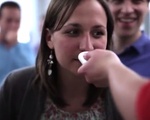SEAS
Smexting with the oPhone
The evolution of virtual communication has been short but significant. Initially, text messages were just that, text. Then, emoticons were integrated (:D). These days, we can communicate with photos, videos, voice memos, and emojis—you never have to actually type again! Now, thanks to Harvard School of Engineering and Applied Sciences professor David Edwards, a completely necessary new way to communicate is available, the smext.
TERMES Project Models Robots Based on Collective Intelligence of Termites
Though typically associated with the destruction of structures, termite colonies may have just inspired the next big innovation in construction. A team of engineers and computer scientists at the School of Engineering and Applied Sciences and the Wyss Institute for Biologically Inspired Engineering built a “colony” of autonomous, interchangeable robots—coined the TERMES project—based on the construction strategies of termites and other insect species, according to a report published in Science earlier this month.
Wyss Institute Team Reveals New Bioprinting Technique
Scientists at the School of Engineering and Applied Sciences and the Wyss Institute for Biologically Inspired Engineering have moved one step closer to successfully printing three-dimensional, fully-functional tissues.
SEAS Task Force Report Outlines Preliminary Vision for Allston Campus
The vision, laid out in a Jan. 20 draft report by the SEAS Teaching and Community Space Task Force obtained by The Crimson, calls specifically for the creation of classroom spaces that will allow for “active learning” and the incorporation of recreational areas.
Harvard Official: A- is Median Grade and A Most Common Across All Three FAS Divisions and SEAS
The new information challenges the belief held by some that grade inflation is less prevalent in courses in the sciences than in the humanities.
Deans' Design Challenge to Address Growing Population
With the world’s population expected to grow exponentially in coming years, the Harvard Innovation Lab is turning to students for solutions to the sociopolitical and environmental problems that population expansion may pose.
In Light of Sequester Cuts, SEAS to Look Elsewhere for Funding
The National Science Foundation is expected to reduce the number of grants for university research from 11,000 to 10,000 per year after this spring’s federal sequester. How this downsizing will affect Harvard’s School of Engineering and Applied Sciences—which receives 80 percent of its federal monies from NSF, according to school administrators—is still unclear, causing the school to anticipate cuts and to look to finding alternative funding sources.
Faculty Hear From SEAS Deans, Faculty Council, and Professors of Religion at Monthly Meeting
Two deans from the School of Engineering and Applied Sciences laid out priorities and concerns on behalf of colleagues involved in the planning process for the school’s eventual move to Allston at the monthly meeting of the Faculty of Arts and Sciences Tuesday afternoon.
With Space and Personnel at a Premium, SEAS To Increase Faculty by Nearly 30 Percent
Facing constraints in manpower and space, the School of Engineering and Applied Sciences is set to make twenty new tenure-track hires and is preparing for its building projects in Allston, SEAS Dean Cherry A. Murray told The Crimson in an interview this week.
Degrees Offered at SEAS
SEAS offers new two-year master's degree for Computational Science and Engineering
SEAS To Offer New Two-Year Master's Degree
The Harvard School of Engineering and Applied Sciences announced on Friday that it will offer a two-year Master of Engineering in the field beginning in fall 2014.
Hanspeter Pfister To Lead Institute for Applied Computational Sciences
Computer science professor Hanspeter Pfister was named director of the Institute for Applied Computational Sciences at the Harvard School of Engineering and Applied Sciences last Monday. Pfister is taking the place of physics professor Efthimios Kaxiras, who has led the Institute since its founding in 2010.
NSF Approves $20 Million Grant for SEAS-Based Research Center
The Center for Integrated Quantum Materials at Harvard will not occupy a physical space at the University, but rather serve as an intellectual group that comprises many top researchers from collaborating institutions.









